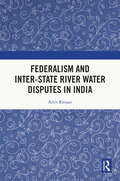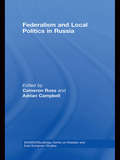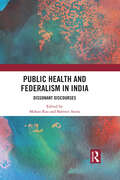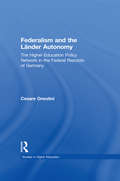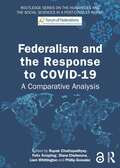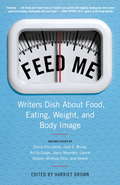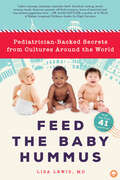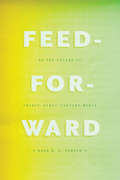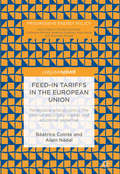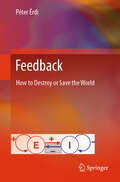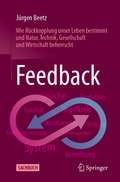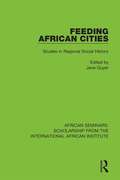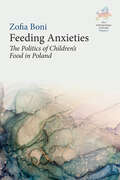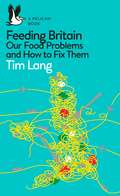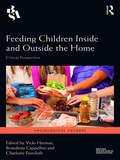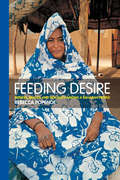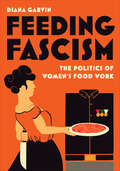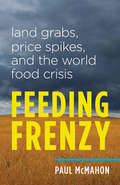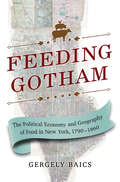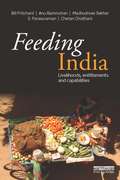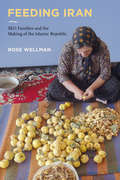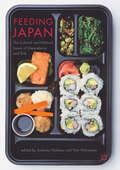- Table View
- List View
Federalism and Inter-State River Water Disputes in India
by Amit RanjanThis book examines the Union-State and inter-State relations concerning water issues in India. It analyses the federal structure in India and looks at its effectiveness in addressing the inter-state river water disputes in the country through three cases: the Cauvery, Krishna and Mahadayi Rivers water dispute. It probes into the physical, political, legal and constitutional measures taken by the Union government and the states to deal with the inter-State and Union-State tussles over inter-State river waters. The author studies the debate over centralisation and decentralisation of water resources, as well as the inter-state river water disputes that have aroused feelings of sub-nationalism in many regions of India. Finally, this book also examines socio-political tensions over multipurpose water projects and other supply-side infrastructures, and their efficacy in addressing India’s increasing water problems. This book will interest researchers and students of Environmental Politics, Political Science, Public Policy, Environmental Geography, Indian Politics, South Asian Studies, Environmental Economics, Environmental Policy, River Management, and Resource politics.
Federalism and Local Politics in Russia (BASEES/Routledge Series on Russian and East European Studies)
by Cameron Ross Adrian CampbellThis book examines federalism and regional and local politics in Russia. Many commentators have alluded to the unique nature of Russia's dual transition and its difficult task of simultaneously reforming its economy and polity. But there is in fact a third transition under way in Russia that is of no less importance, the need to reconfigure central-local relations and to create a stable and viable form of federalism. Federal states are much more difficult to set up than unitary ones, and forging a new federal system at the same time as privatising the economy and trying to radically overhaul the political system has clearly made Russia's transition triply difficult. The book discusses how Vladimir Putin has re-asserted the power of the centre in Russia, and tightened the federal government's control of the regions. It shows how, contrary to his rhetoric about developing Russia as a free and democratic state, authoritarianism has been extended - through his reorganisation of the Federation Council, his usurpation of powers to dismiss regional assemblies and chief executives, and his creation of seven unelected super-governors. The book explores a wide range of issues related to these developments, including a comparative study of Russian federalism and local politics, ethnic federalism, the merging of federal units, regional governors, electoral and party reforms, and regional and local politics. It also includes case studies of local and regional politics in specific regions.
Federalism and Public Health in India: Dissonant Discourses
by Balveer Arora Mohan RaoThe interface of public health and federalism are increasingly gaining scholarly attention in the fields of comparative federalism and welfare state studies. This volume looks into various facets of public health and governance in India from a legal, institutional and policy perspective.The volume explores the regulatory architecture around healthcare in federal systems of governance; public finance and insurance; private sector in medical care and the tussle for power between the union and the states. A multidisciplinary volume with essays from scholars working in public health, economics, political science and legal studies, the book critically evaluates India’s public policy apparatus dealing with health crises, inequity and the lack of health infrastructure and resources among other challenges. It also looks at the impact of the Covid-19 pandemic on federalism and democratic structures as well as the role of institutions such as the NITI Aayog and other central agencies in policy formulation and implementation within the broader framework of intergovernmental relations in a federal system.The book will be of interest to students and researchers of public health, public policy, health administration, medical sociology, constitutional law and political science, as well as of federalism.
Federalism and the Lander Autonomy: The Higher Education Policy Network in the Federal Republic of Germany, 1948-1998 (RoutledgeFalmer Studies in Higher Education)
by Cesare OnestiniAn interesting study of the German higher Education system, examining the development of higher education policies from the post-war years, to the post-unification period.
Federalism and the Response to COVID-19: A Comparative Analysis (Routledge Series on the Humanities and the Social Sciences in a Post-COVID-19 World)
by Rupak ChattopadhyayThe COVID-19 pandemic bared the inadequacies in existing structures of public health and governance in most countries. This book provides a comparative analysis of policy approaches and planning adopted by federal governments across the globe to battle and adequately respond to the health emergency as well as the socio-economic fallouts of the pandemic. With twenty-four case studies from across the globe, the book critically analyzes responses to the public health crisis, its fiscal impact and management, as well as decision-making and collaboration between different levels of government of countries worldwide. It explores measures taken to contain the pandemic and to responsibly regulate and manage the health, socio-economic welfare, employment, and education of its people. The authors highlight the deficiencies in planning, tensions between state and local governments, politicization of the crisis, and the challenges of generating political consensus. They also examine effective approaches used to foster greater cooperation and learning for multi-level, polycentric innovation in pandemic governance. One of the first books on federalism and approaches to the COVID-19 pandemic, this volume is an indispensable reference for scholars and researchers of comparative federalism, comparative politics, development studies, political science, public policy and governance, health and wellbeing, and political sociology.
Federalism, Nationalism and Development: India and the Punjab Economy (Routledge Contemporary South Asia Series)
by Pritam SinghThis book throws new light on the study of India's development through an exploration of the triangular relationship between federalism, nationalism and the development process. It focuses on one of the seemingly paradoxical cases of impressive development and sharp federal conflicts that have been witnessed in the state of Punjab. The book concentrates on the federal structure of the Indian polity and it examines the evolution of the relationship between the centre and the state of Punjab, taking into account the emergence of Punjabi Sikh nationalism and its conflict with Indian nationalism. Providing a template to analyse regional imbalances and tensions in national economies with federal structures and competing nationalisms, this book will not only be of interest to researchers on South Asian Studies, but also to those working in the fields of politics, political economy, geography and development.
Feed Me! Writers Dish About Food, Eating, Weight, and Body Image
by Harriet BrownThis collection of poignant, heartbreaking, and funny essays includes works from some of the literary world's most accomplished authors about one issue that plagues nearly every woman: her relationship with food.
Feed the Baby Hummus: Pediatrician-Backed Secrets from Cultures Around the World
by Lisa LewisParenting practices vary widely between countries and cultures. For example, in countries such as the Philippines, breastfeeding after age one year is common, and parents can make their own decision about what is right for their family. In Korea, babies eat a variety of spices and flavors, helping them develop a diverse palate and healthy eating habits. And in Italy, parents prevent separation anxiety by taking their babies to markets, restaurants, and churches and passing them around from person to person.Feed the Baby Hummus teaches parents to confidently incorporate various multicultural practices into their own caretaking plan. Pediatrician Lisa Lewis offers the wisdom and proven caretaking practices of the cultures of the world, drawn from her own training, research, travel, and clinical experience. Although certain standards of care must exist for babies to thrive and be happy, Feed the Baby Hummus offers a variety of cross-cultural parenting information and baby care guidance from a trusted source.
Feed-Forward: On the Future of Twenty-First-Century Media
by Mark B. N. HansenEven as media in myriad forms increasingly saturate our lives, we nonetheless tend to describe our relationship to it in terms from the twentieth century: we are consumers of media, choosing to engage with it. In Feed-Forward, Mark B. N. Hansen shows just how outmoded that way of thinking is: media is no longer separate from us but has become an inescapable part of our very experience of the world. Drawing on the speculative empiricism of philosopher Alfred North Whitehead, Hansen reveals how new media call into play elements of sensibility that greatly affect human selfhood without in any way belonging to the human. From social media to data-mining to new sensor technologies, media in the twenty-first century work largely outside the realm of perceptual consciousness, yet at the same time inflect our every sensation. Understanding that paradox, Hansen shows, offers us a chance to put forward a radically new vision of human becoming, one that enables us to reground the human in a non-anthropocentric view of the world and our experience in it.
Feed-in tariffs in the European Union
by Alain Nadaï Béatrice CointeThis book is a sociological account of the historical trajectory of feed-in tariffs (FITs) as an instrument for the promotion of renewable energy in Europe. Chapters analyse the emergence and transformations of feed-in tariffs as part of the policy arsenal developed to encourage the creation of markets for RES-E in Europe. The authors explore evolving conceptions of renewable energy policy at the intersection between environmental objectives, technological change and the ambition to liberalise the internal electricity market. They draw conclusions on the relationships between markets and policy-making as it is instituted in the European Union, and on the interplay between the implementation of a European vision on energy and national politics. Distinctive in both its approach and its methods the books aim is not to discuss the design of feed-in tariffs and their evolution, nor is it to assess their efficiency or fairness. Instead, the authors seek to understand what makes feed-in tariffs what they are, and how this has changed over time.
Feedback: How to Destroy or Save the World
by Péter ÉrdiThe book offers an exciting, non-technical intellectual journey around applying feedback control to emerging and managing local and global crises, thus keeping the world on a sustainable trajectory. There is a narrow border between destruction and prosperity: to ensure reasonable growth but avoid existential risk, we must find the fine-tuned balance between positive and negative feedback. This book addresses readers belonging to various generations, such as: young people growing up in a world where everything seems to be falling apart; people in their 30s and 40s who are thinking about how to live a fulfilling life; readers in their 50s and 60s thinking back on life; and Baby Boomers reflecting on their past successes and failures. Albert-László Barabási, Robert Gray Dodge Professor of Network Science, Northeastern University: “In a world where interconnectedness has fostered global prosperity, it has also introduced vulnerabilities that can escalate local failures into worldwide crises. “Feedback” by Peter Erdi explores this double-edged sword, offering a solution through the power of feedback mechanisms. These tools are designed to mitigate the negative impacts of connectedness, steering the complexity of modern life towards outcomes that enhance human welfare.” Patrick Grim, Philosopher in Residence Visiting Scholar Center for Complex Systems University of Michigan: “Érdi demonstrates that many of the critical problems we face—from climate crises to economic instability to the threat of terrorism—operate as runaway feedback loops. The first challenge is to understand them. The second is to introduce control mechanisms on the model of biological homeostasis—a different form of feedback—that will guide us toward a more sustainable social future. Érdi applies the analytic tools of complex systems to some of the most complex issues we face.” Ichiro Tsuda, Specially Appointed Professor at Sapporo City University, Sapporo, Japan, leaving Chubu University Academy of Emerging Sciences (Director and Professor), Chubu University, Japan: “This book is dangerous, because of making your own consideration on feedback impossible to stop by a continual feedback process of yourself. Nevertheless, you must be given a method of finding very narrow boundaries between prosperity and destruction, therefore this book is extremely valuable. We all must read.”
Feedback: Wie Rückkopplung unser Leben bestimmt und Natur, Technik, Gesellschaft und Wirtschaft beherrscht
by Jürgen BeetzFeedback wird im breiteren Sinne als Rückkopplung verstanden, nicht nur als verbale Rückmeldung. Rückkopplung ist das Rückführen der Wirkung auf die Ursache – und die verblüffenden Effekte sind in allen Lebensbereichen anzutreffen.Der Wissenschaftsautor Jürgen Beetz spricht Sie als Leser direkt an und entdeckt mit IhnenGeschichten des Alltags mit merkwürdigen Feedback-Effekten,die Selbstbezüglichkeit und die daraus entstehenden Widersprüche,die Eigenschaften komplexer dynamischer vernetzter Systeme,das Wesen der Rückkopplung, das aus diesen Bedingungen hervorgeht,Rückkopplungseffekte in der Technik, der Natur, der Gesellschaft, der Politik, der Wirtschaft ... und im Rest der Welt,das „mächtigste Konzept der Welt“, die Evolution.Sie verstehen, was passiert, wenn die Wirkung zur Ursache wird. Rückkopplung bestimmt unser Leben. Sie scheint oft im Verborgenen zu wirken. Wir bemerken sie erst, wenn sie ihr Werk schon getan hat. Manchmal voller Zufriedenheit, wenn sie stabilisierend war, aber oft mit Schrecken, wenn sie sich in einem „Teufelskreis“ aufgeschaukelt hat. Noch weniger ahnen wir, wie schwer sie oft zu durchschauen oder gar zu beherrschen ist. Aktuelle Krisen mit oft hochkomplexen Rückkopplungen führen uns das täglich vor Augen. Nach der Lektüre dieses Buches sehen Sie genauer hin.Das Werk ist in der zweiten Auflage vollständig durchgesehen und erweitert. Hinzugefügt wurde ein Abschnitt über das dynamische Verhalten von Systemen.Stimmen zur ersten Auflage„Ein wichtiges Buch, das ein zentrales Element kreativer Entwicklungen in Natur und Gesellschaft in all seinen Facetten beleuchtet.“Prof. Dr. Bernd-Olaf Küppers, Friedrich-Schiller-Universität Jena „Dieses Buch beschreibt sehr anschaulich, dass Systeme in Natur, Technik und Gesellschaft ohne Feedbacknicht – oder nur sehr ineffizient – funktionieren könnten. Es zeigt, dass Rückkopplung ein zentrales Prinzip darstellt, das das Verhalten von Systemen zum Besseren (bei falschem Gebrauch aber auch zum Schlechteren) verändern kann. Es ist deshalb eminent wichtig, die Bedeutung und das Potential dieses Prinzips zu erfassen. Dies ermöglicht dieses Buch in leicht lesbarer Weise.“Prof. Dr. Jörg Raisch, Technische Universität Berlin, Fachgebiet Regelungssysteme, Max-Planck-Institut für Dynamik komplexer technischer SystemeDer AutorJürgen Beetz studierte nach einer humanistischen und naturwissenschaftlichen Schulausbildung Elektrotechnik, Mathematik und Informatik an der TH Darmstadt und der University of California, Berkeley. Bei einem internationalen IT-Konzern war er als Systemanalytiker, Berater und Dozent in leitender Funktion tätig. Von ihm sind im selben Verlag „1+1=10: Mathematik für Höhlenmenschen“ sowie „E=mc²: Physik für Höhlenmenschen“ erschienen.
Feeding African Cities: Studies in Regional Social History (African Seminars: Scholarship from the International African Institute #4)
by Jane GuyerOriginally published in 1987, this book traces the broad outlines of urban food policy, drawing attention to the limited knowledge of regional social history. Urban food supply systems in Africa have developed very fast, in the midst of societies in which food production was not in general oriented to feeding distant populations of 'specialist consumers'. Institutional and political links had to be forged between town and country if food supply was to be cheap and predictable. This volume explores the political and material dynamics of urban food supply through 4 case studies: Kano, Yaoundé, Dar es Salaam and Harare.
Feeding Anxieties: The Politics of Children's Food in Poland (New Anthropologies of Europe: Perspectives and Provocations #6)
by Zofia BoniFocusing on the underlying politics behind children’s food, this book highlights the variety of social relationships, expectations and emotions ingrained in feeding children in Poland. With rich ethnographic accounts, including research with children, the book demonstrates how families, schools, the food industry and state agencies shape and experience feeding anxieties, and how such anxiety is at the heart of a new form of sociality. The book complicates our understanding of health and modern subjectivity and unpacks what and how we feed children today.
Feeding Britain: Our Food Problems and How to Fix Them (Pelican Books)
by Tim LangHow does Britain get its food? Why is our current system at breaking point?How can we fix it before it is too late?British food has changed remarkably in the last half century. As we have become wealthier and more discerning, our food has Europeanized (pizza is children's favourite food) and internationalized (we eat the world's cuisines), yet our food culture remains fragmented, a mix of mass 'ultra-processed' substances alongside food as varied and good as anywhere else on the planet.This book takes stock of the UK food system: where it comes from, what we eat, its impact, fragilities and strengths. It is a book on the politics of food. It argues that the Brexit vote will force us to review our food system. Such an opportunity is sorely needed. After a brief frenzy of concern following the financial shock of 2008, the UK government has slumped once more into a vague hope that the food system will keep going on as before. Food, they said, just required a burst of agri-technology and more exports to pay for our massive imports.Feeding Britain argues that this and other approaches are short-sighted, against the public interest, and possibly even strategic folly. Setting a new course for UK food is no easy task but it is a process, this book urges, that needs to begin now.'Tim Lang has performed a public service' Simon Jenkins, Sunday Times
Feeding Children Inside and Outside the Home: Critical Perspectives (Sociological Futures)
by Charlotte Faircloth Vicki Harman Benedetta CappelliniThis cross-disciplinary volume brings together diverse perspectives on children’s food occasions inside and outside of the home across different geographical locations. By unpacking mundane food occasions - from school dinners to domestic meals and from breakfast to snacks - Feeding Children Inside and Outside the Home shows the role of food in the everyday lives of children and adults around them. Investigating food occasions at home, schools and in nurseries during weekdays and holidays, this book reveals how children, mothers, fathers, teachers and other adults involved in feeding children, understand, make sense of and navigate ideological discourses of parenting, health imperatives and policy interventions. Revealing the material and symbolic complexity of feeding children, and the role that parenting and healthy discourses play in shaping, perpetuating and transforming both feeding and eating, this volume shows how micro and macro aspects are at play in mundane and everyday practices of family life and education. This volume will be of great interested to a wide range of students and researchers interested in the sociology of family life, education, food studies and everyday consumption.
Feeding Desire: Fatness, Beauty and Sexuality Among a Saharan People
by Rebecca PopenoeWhile the Western world adheres to a beauty ideal that says women can never be too thin, the semi-nomadic Moors of the Sahara desert have for centuries cherished a feminine ideal of extreme fatness. Voluptuous immobility is thought to beautify girls' bodies, hasten the onset of puberty, heighten their sexuality and ripen them for marriage. From the time of the loss of their first milk teeth, girls are directed to eat huge bowls of milk and porridge in one of the world's few examples of active female fattening. Based on fieldwork in an Arab village in Niger, Feeding Desire analyses the meanings of women's fatness as constituted by desire, kinship, concepts of health, Islam, and the crucial social need to manage sexuality. By demonstrating how a particular beauty ideal can only be understood within wider social structures and cultural logics, the book also implicitly provides a new way of thinking about the ideal of slimness in late Western capitalism. Offering a reminder that an estimated eighty per cent of the world's societies prefer plump women, this gracefully written book is both a fascinating exploration of the nature of bodily ideals and a highly readable ethnography of a Saharan people.
Feeding Fascism: The Politics of Women’s Food Work (Toronto Italian Studies)
by Diana GarvinFeeding Fascism explores how women negotiated the politics of Italy’s Fascist regime in their daily lives and how they fed their families through agricultural and industrial labour. The book looks at women’s experiences of Fascism by examining the material world in which they lived in relation to their thoughts, feelings, and actions. Over the past decade, Diana Garvin has conducted extensive research in Italian museums, libraries, and archives. Feeding Fascism includes illustrations of rare cookbooks, kitchen utensils, cafeteria plans, and culinary propaganda to connect women’s political beliefs with the places that they lived and worked and the objects that they owned and borrowed. Garvin draws on first-hand accounts, such as diaries, work songs, and drawings, that demonstrate how women and the Fascist state vied for control over national diet across many manifestations – cooking, feeding, and eating – to assert and negotiate their authority. Revealing the national stakes of daily choices, and the fine line between resistance and consent, Feeding Fascism attests to the power of food.
Feeding Frenzy
by Paul McmahonFeeding Frenzy traces the history of the global food system and reveals the underlying causes of recent turmoil in food markets. Supplies are running short, prices keep spiking, and the media is full of talk of a world food crisis. The turmoil has unleashed some dangerous forces. Food-producing countries are banning exports even if this means starving their neighbors. Governments and corporations are scrambling to secure control of food supply chains. Powerful groups from the Middle East and Asia are acquiring farmland in poor countries to grow food for export - what some call land grabs. This raises some big questions. Can we continue to feed a burgeoning population? Are we running out of land and water? Can we rely on free markets to provide? This book reveals trends that could lead to more hunger and conflict. But Paul McMahon also outlines actions that can be taken to shape a sustainable and just food system.
Feeding Frenzy: Attack Journalism and American Politics
by Larry J. SabatoThe author presents the phenomenon of "attack journalism." In describing "attack journalism," he exposes the harm done by the media to politicians and the harm done to the journalistic profession itself. The author examines the origins of feeding frenzies and gives lessons and possible remedies.
Feeding Gotham: The Political Economy and Geography of Food in New York, 1790-1860
by Gergely BaicsNew York City witnessed unparalleled growth in the first half of the nineteenth century, its population rising from thirty thousand people to nearly a million in a matter of decades. Feeding Gotham looks at how America's first metropolis grappled with the challenge of provisioning its inhabitants. It tells the story of how access to food, once a public good, became a private matter left to free and unregulated markets--and of the profound consequences this had for American living standards and urban development.Taking readers from the early republic to the Civil War, Gergely Baics explores the changing dynamics of urban governance, market forces, and the built environment that defined New Yorkers' experiences of supplying their households. He paints a vibrant portrait of the public debates that propelled New York from a tightly regulated public market to a free-market system of provisioning, and shows how deregulation had its social costs and benefits. Baics uses cutting-edge GIS mapping techniques to reconstruct New York's changing food landscapes over half a century, following residents into neighborhood public markets, meat shops, and groceries across the city's expanding territory. He lays bare how unequal access to adequate and healthy food supplies led to an increasingly differentiated urban environment.A masterful blend of economic, social, and geographic history, Feeding Gotham traces how this highly fragmented geography of food access became a defining and enduring feature of the American city.
Feeding Hungry People: Rulemaking in the Food Stamp Program
by Jeffrey M. BerryThe book talks in detail about the history of the food stamp program and the development of its regulations along with the case study in the larger perspective of legislative, administrative, and interest group behavior.
Feeding India: Livelihoods, Entitlements and Capabilities
by S. Parasuraman Bill Pritchard Madhushree Sekher Anu Rammohan Chetan ChoithaniFood security is one of the twenty-first century’s key global challenges, and lessons learned from India have particular significance worldwide. Not only does India account for approximately one quarter of the world’s under-nourished persons, it also provides a worrying case of how rapid economic growth may not provide an assumed panacea to food security. This book takes on this challenge. It explains how India’s chronic food security problem is a function of a distinctive interaction of economic, political and environmental processes. It contends that under-nutrition and hunger are lagging components of human development in India precisely because the interfaces between these aspects of the food security problem have not been adequately understood in policy-making communities. Only through an integrative approach spanning the social and environmental sciences, are the fuller dimensions of this problem revealed. A well-rounded appreciation of the problem is required, informed by the FAO’s conception of food security as encompassing availability (production), access (distribution) and utilisation (nutritional content), as well as by Amartya Sen’s notions of entitlements and capabilities.
Feeding Iran: Shi`i Families and the Making of the Islamic Republic
by Rose WellmanSince Iran's 1979 Revolution, the imperative to create and protect the inner purity of family and nation in the face of outside spiritual corruption has been a driving force in national politics. Through extensive fieldwork, Rose Wellman examines how Basiji families, as members of Iran's voluntary paramilitary organization, are encountering, enacting, and challenging this imperative. Her ethnography reveals how families and state elites are employing blood, food, and prayer in commemorations for martyrs in Islamic national rituals to create citizens who embody familial piety, purity, and closeness to God. Feeding Iran provides a rare and humanistic account of religion and family life in the post-revolutionary Islamic Republic that examines how home life and everyday piety are linked to state power.
Feeding Japan: The Cultural and Political Issues of Dependency and Risk
by Andreas Niehaus Tine WalravensThis edited collection explores the historical dimensions, cultural practices, socio-economic mechanisms and political agendas that shape the notion of a national cuisine inside and outside of Japan. Japanese food is often perceived as pure, natural, healthy and timeless, and these words not only fuel a hype surrounding Japanese food and lifestyle worldwide, but also a domestic retro-movement that finds health and authenticity in ‘traditional’ ingredients, dishes and foodways. The authors in this volume bring together research from the fields of history, cultural and religious studies, food studies as well as political science and international relations, and aim to shed light on relevant aspects of culinary nationalism in Japan while unearthing the underlying patterns and processes in the construction of food identities.
